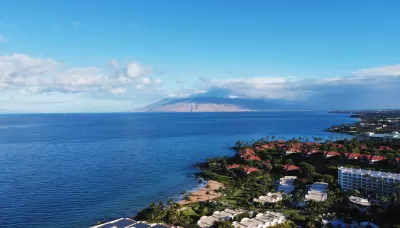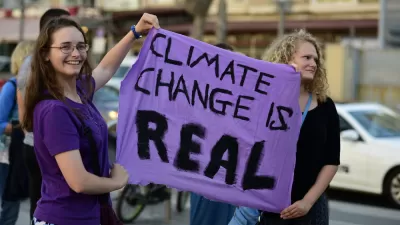Learn how Maui County is integrating sea level rise and coastal threats into planning for and protecting its 65 beach parks.

Maui is perhaps best known as a popular tourist destination. After all, the Hawaiian island is beloved for its world-famous beaches, the sacred ʻĪao Valley, views of humpback whales, farm-to-table cuisine, and the magnificent sunrise and sunset from Haleakalā. However, Maui is also facing some challenges related to climate change.
In this article, Maui County Department of Parks and Recreation (DPR) planners David Yamashita and Jen Maydan discuss an important project initiated in 2020 to assess the vulnerability of beach parks and facilities to flooding and land loss due to sea level rise and other threats and to identify adaptation strategies to address these threats. Completed with the assistance of Tetra Tech, Inc., the project consists of four phases: (1) identify the vulnerability rating for each park; (2) prepare six general strategies; (3) develop an interactive web-based app; and (4) prepare more detailed recommendations for parks that are particularly vulnerable to coastal threats in the short term.
The analysis generated a wealth of information about park vulnerability and adaptation responses, which varied by district. Most parks, about 60 percent, have a medium adaptation potential, while 20 percent have a high potential, and 20 percent have a low potential. Of the six adaptation strategies, “maintain facilities and monitor conditions” was recommended for 30 percent of the 65 parks. “Assess park viability based on future access” was the second most recommended strategy, which indicates that park access roads also are vulnerable to shoreline hazards. A key takeaway is that sea-level rise is a problem that affects the DPR and state and county departments, all of which will need to coordinate and collaborate.
For more information, please read the source article.
FULL STORY: Climate Change Is Now

Maui's Vacation Rental Debate Turns Ugly
Verbal attacks, misinformation campaigns and fistfights plague a high-stakes debate to convert thousands of vacation rentals into long-term housing.

Planetizen Federal Action Tracker
A weekly monitor of how Trump’s orders and actions are impacting planners and planning in America.

In Urban Planning, AI Prompting Could be the New Design Thinking
Creativity has long been key to great urban design. What if we see AI as our new creative partner?

King County Supportive Housing Program Offers Hope for Unhoused Residents
The county is taking a ‘Housing First’ approach that prioritizes getting people into housing, then offering wraparound supportive services.

Researchers Use AI to Get Clearer Picture of US Housing
Analysts are using artificial intelligence to supercharge their research by allowing them to comb through data faster. Though these AI tools can be error prone, they save time and housing researchers are optimistic about the future.

Making Shared Micromobility More Inclusive
Cities and shared mobility system operators can do more to include people with disabilities in planning and operations, per a new report.
Urban Design for Planners 1: Software Tools
This six-course series explores essential urban design concepts using open source software and equips planners with the tools they need to participate fully in the urban design process.
Planning for Universal Design
Learn the tools for implementing Universal Design in planning regulations.
planning NEXT
Appalachian Highlands Housing Partners
Mpact (founded as Rail~Volution)
City of Camden Redevelopment Agency
City of Astoria
City of Portland
City of Laramie





























